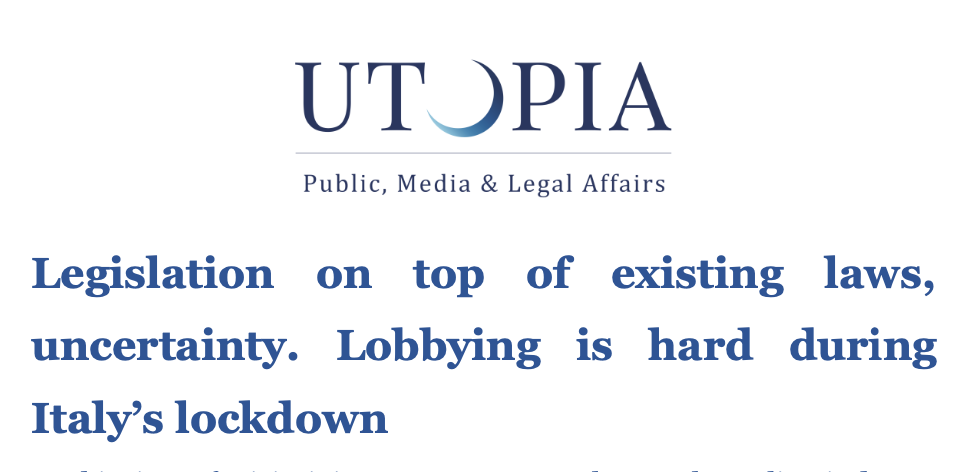
At this time of crisis, it is necessary to get close to the Italian industry because companies are confused by the jungle of laws, decrees, measures and ordinances that chase each other in a regulatory vortex
by Giampiero Zurlo*
When I have to tell university students how much important is lobbying for a company today and why the law can have a far greater impact on business than any other economic factor, I always refer the example of the Kinder Surprise eggs in the United States. There is nothing clearer and there is no student who does not suddenly return to focus on the lesson then when I explain that in the US a product absolutely legal elsewhere is prohibited by the law.
In fact, the production and marketing of confectionery products with plastic parts inside are prohibited in the American market since 1938. The result is that for the glorious chocolate treats with a little toy in the middle classic market rules no longer apply, to the delight of its competitors in the US confectionery.
What is happening now in Italy with the measures adopted to contain the COVID-19 outbreak constitutes perhaps an even clearer example of the impact that legislation can have on companies’ business. It no longer matters the quality of a product, its price, advertising promotion, the relationship with consumers and their purchasing decisions. No ordinary rule of economic competition retains any value when a State law prohibits a commercial activity or an industrial plant from continuing its activities.
That is why during this time of crisis the competence of lobbying professionals takes on even more value. Or it becomes necessary standing beside the Italian industry to help it overcome the jungle of laws, decrees and other legislative measures that follow each other like in a regulatory vortex, confusing even the companies with a proven lobbying maturity.
Nobody questions that blocking the production and freezing commercial activities have the function of protecting public health, as well as any other kind of virus containment policy. Still, the risk here is that the legislator harms constitutional interests that are equally protected and falls into some form of inconsistency, in the legitimate urgency to manage the emergency. With the effect of making the economic consequences of the so-called regulatory risk and regulatory uncertainty even more blatant.
In fact, there is no production sector in Italy that has not had to deal with the impact of legislation on its business, given the vast scope of the anti-coronavirus measures adopted by the government. Over the past few weeks, there have been thousands of cases of companies questioning even at night-time if they could have continued their activities the next day, or if instead they had to stop. Added to this is the everlasting issue of powers competition between the central State and regions, with plenty of constitutionalists debating for days whether the decree of the Prime Minister could prevail on regional ordinances. With the sole effect of further increasing the uncertainty among economic operators, even the most authoritative.
The risk for a company is also represented by the fact that in the Italian legislative process ‘going back’ is not an option. When a law is passed it becomes practically impossible to modify it, since the legislative process is slow and cumbersome. So, the only course of action is going ahead with new measures, while the emergency reduces even more an already tight wiggle room. It is an unstoppable regulatory race against the virus, which requires outside normal response capabilities.
The government is well aware of this and on several occasions Premier Giuseppe Conte himself referred to the need to pay attention to the Country’s and companies’ economic interests, which enjoy equal constitutional protection. And this is how the FAQs emerge, or the Cabinet’s responses to frequently asked questions by citizens and businesses. “I’m a vehicle rental, can I stay open to guarantee the food supply chain by renting trucks?”; “I’m an e-cig shop that sells monopolies, why are tobacconists open while we should stay closed?”; “I’m a florist, can I continue to grow flowers and sell them or do I have to see them wither?”; “I’m a factory that must close, can I perform plants maintenance? Why is the production of plastic and cardboard authorized, but not that of glass?”. With its FAQs, the government breaks even the more orthodox schemes and tries to manage the emergency by creating a new source of law: the Palazzo Chigi website.
In short, the COVID-19 emergency has changed and will change everything. The way of lobbying and representing economic interests towards public institutions will almost certainly change too. It is also the task of institutional relations professionals to ensure that these transformations bring about positive improvements, preventing everything from changing only to leave things unchanged.
*Giampiero Zurlo is President and CEO of UTOPIA – Public, Media & Legal Affairs
